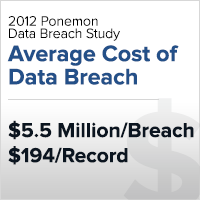In our practice here at Townsend Security we engage with a lot of startups and mature ISVs who are trying to grow their business and customer base, leverage their technologies into new opportunities, and grow or migrate to the cloud. We know how difficult it is to start and grow a company, and what a wide set of business challenges have to be overcome. Our hats are off to every entrepreneur who has created a successful company, and every ISV who has kept it going!
 I want to share a few thoughts on some pitfalls that can damage your ability to grow your company with a focus on the encryption of sensitive data. Too many promising companies flounder because of poor security implementations, and failing to get encryption right can lead to lost opportunities - maybe even the loss of that breakout sale you need to land a global company. Some early thought and planning about data security can help you weather your migration up the food chain and avoid such losses.
I want to share a few thoughts on some pitfalls that can damage your ability to grow your company with a focus on the encryption of sensitive data. Too many promising companies flounder because of poor security implementations, and failing to get encryption right can lead to lost opportunities - maybe even the loss of that breakout sale you need to land a global company. Some early thought and planning about data security can help you weather your migration up the food chain and avoid such losses.
Number 1: Failure to encrypt sensitive data
The single biggest failure of data security is not doing it at all. Even in this age of massive public data breaches, and the damage that they do to companies of all sizes, most startups and ISVs are not implementing encryption of sensitive data. When product managers and developers work on their next big idea, they focus on exciting features in their product and often ignore the work it takes to implement encryption. They instead rely on access control lists and other mechanisms to protect data. These are, of course, important things to do. But the failure to encrypt sensitive data leaves a big hole in your security strategy.
What can go wrong if you haven’t implemented encryption? LOTS !!!
- The publicity around a data breach can tarnish your reputation and kill opportunities.
- The lack of encryption may cause compliance regulation failures making it impossible to enter new markets.
- You may not be able to pass a security review of your software by that large global Enterprise.
- You may not be able to enter government channels where encryption is a mandate.
- If your customer experiences a data breach you may encounter substantial litigation costs that damage your financial resources and delay critical development.
- You may fail to secure that next round of funding when an investor discovers the security gaps in your product.
When these kinds of events damage your ability to grow your company, it can be hard to mitigate them in a timely fashion. And you often won’t know about these dangers until you get fairly far down the road with your business plan.
Number 2: Failure to get key management right
For startups and ISVs who DO understand the need for encryption of sensitive data, the next biggest pitfall is the failure to protect encryption keys properly. Almost every database that supports encryption also supports the ability to protect the database encryption keys with a key manager. But that doesn’t mean that good key management is the default! In most cases the default database key management option is to store the encryption keys on the same server as the sensitive data. Sometimes the database will even store the encryption key locally and in the clear! So getting encryption key management right is critical to your security strategy. It won’t help to have encryption of your data enabled, and then have a cybercriminal steal your data along with the encryption key.
Related to key management here are some things to look for when you consider databases for your application:
- Does your database have built-in encryption? Relying on third-party encryption solutions at the file/folder level will certainly cause deployment and scalability problems.
- Does your database support integration with third-party key managers? If there is no easy way to integrate proper key management into the database, this will also cause deployment and technology delays.
- Does your database support open standards for key management? For example, the Key Management Interoperability Protocol (KMIP) defines how applications like databases can easily integrate a key manager.
- Does your database support key management failover? Remember that protecting encryption keys with a key manager also brings along the question of high availability and failover.
HINT:
If you are a startup be sure to choose a database that supports built-in encryption and proper key management. You have lots of good choices in both commercial and open source solutions. So go with a database with native, built-in encryption and key management!
Number 3: Failure to get FIPS 140-2 right
There are important standards and certifications for key management solutions. The most important of these is the National Institute of Standards and Technology’s (NIST) FIPS 140-2 standard. In addition to being a published standard, there is also a validation process for key management systems. The standard, and the validation to that standard, are critically important to your data security strategy. All professional key management solutions have been validated to the FIPS 140-2 standard and you should be sure to deploy a validated key management solution. This will help you avoid failing a security audit by that important new customer!
In addition to ensuring that your key manager is validated to FIPS 140-2, be sure that the entire key management solution is validated. There are many cases where the encryption library alone is validated to FIPS 140-2, but the key management application is not. It is good to have validated encryption, but that is just the start! Encryption key management has its own validation points and you will need both.
Snake Oil Alert !!!
Unfortunately, there are some key management solutions that make unwarranted claims about FIPS 140-2 compliance and validation. Here are a few warning signs to look for when you evaluate a key management solution:
- A vendor makes compliance claims, but there is no validation. Some vendors claim to be “FIPS 140-2 compliant” but in fact have never completed a FIPS 140-2 validation. Security is hard, and unsubstantiated claims should be a red flag.
- A vendor claims FIPS 140-2 compliance, but the validation is “in process”, but not complete. A security product can be “in process” for many months or even years. A claim of FIPS 140-2 compliance without actual completion should also be a red flag.
- A vendor makes some claims of FIPS 140-2 validation, but research shows that the key management solution was not validated by that vendor.
- A vendor makes a claim of FIPS 140-2 compliance, but the solution is only compliant when backed by a third party validated key management solution. In this case the vendor solution itself is not validated, but relies on the validation of another solution. You may be fooled into thinking that the solution itself is compliant when it is not. Especially watch for this pitfall with open source solutions.
You can always check a vendor’s claims of FIPS 140-2 compliance. Ask for the NIST FIPS 140-2 certificate number, and then Google it. NIST makes the validation certificate available to the public on their website. Copy and paste this into Google search:
NIST FIPS 140-2 certificate number 1449
That was easy!
Number 4: Failure to make encryption and key management easy and invisible
Now that you are on the road to getting encryption and key management right, it is important to also make it easy and invisible. Your customers have a lot on their agendas, and becoming a key management expert is probably not one of them. So even if you follow the above advice and implement encryption and key management, do your customers a favor and make key management easy. The best way to do this is to bundle a key management solution into your product, and make key management automatic. You can still enable the configuration of an external key management system (some customers will want this), but you can really make it easy for most of your customers if you automate the key management tasks.
Automating key management is a great competitive advantage! One of our partners in the archival and backup space implemented this strategy and make great competitive wins on this feature alone! Their message was simple:
“We have encryption and key management. It is FIPS 140-2 validated. It is completely automatic so you don’t have to spend time fiddling around with a complex key management system.”
This strategy won them a lot of competitive deals and it was easy to talk about - and it shortened the sales cycle. Of course, be sure that your key management solution supports this type of integration and automation!
Number 5: Failure to segment customer data
As you move to the cloud and create shared, multi-tenant SaaS solutions, be sure to plan for and architect data segmentation into your solution. You will encounter large customers who will not want to have their data in the same space as other customers. They will want the additional security of segmenting their data into a virtual private cloud. With planning, your technical team can meet this kind of requirement, and help you close that very large deal.
Of course, a data segmentation plan requires a key management segmentation plan. For the same reasons customers want to segment their data, they don’t want to share key management with other customers. And they want to maintain full control of the key management implementation. So be sure to plan for customer-specific deployments of encryption key management and failover key management servers. A properly implemented data and key management segmentation plan will even allow for on-premise deployments that are “cloud ready.”
Number 6: Failure to develop new market opportunities
Think about Amazon (the company) for a moment. At one point in their history they were an online bookstore. Today the company is very different. Amazon first leveraged its technologies to sell all kinds of products, and then created Amazon Web Services (AWS) to enable all of us to benefit from cloud technologies.
Are you thinking like Amazon? If not, you might be missing some big opportunities. Now that you have secure applications, are there lateral opportunities or technology licensing opportunities available to you? When you approach new opportunities and partners, don’t be afraid to talk about security. Regardless of what you’ve heard:
SECURITY SELLS!



 “Merchants are very worried about data breaches and the potential effect of a breach on their business. The average data breach costs a company $5.5 million, which includes the cost of fines as well as the costs associated with lost business, litigation, and brand damage. A successful exploit of poor data security can destroy years of work building brand reputation. Smaller businesses may never fully recover from a well-publicized data breach. Payment application vendors with poor encryption and key management are subjecting not only their customers to these risks, but themselves as well.”
“Merchants are very worried about data breaches and the potential effect of a breach on their business. The average data breach costs a company $5.5 million, which includes the cost of fines as well as the costs associated with lost business, litigation, and brand damage. A successful exploit of poor data security can destroy years of work building brand reputation. Smaller businesses may never fully recover from a well-publicized data breach. Payment application vendors with poor encryption and key management are subjecting not only their customers to these risks, but themselves as well.”






